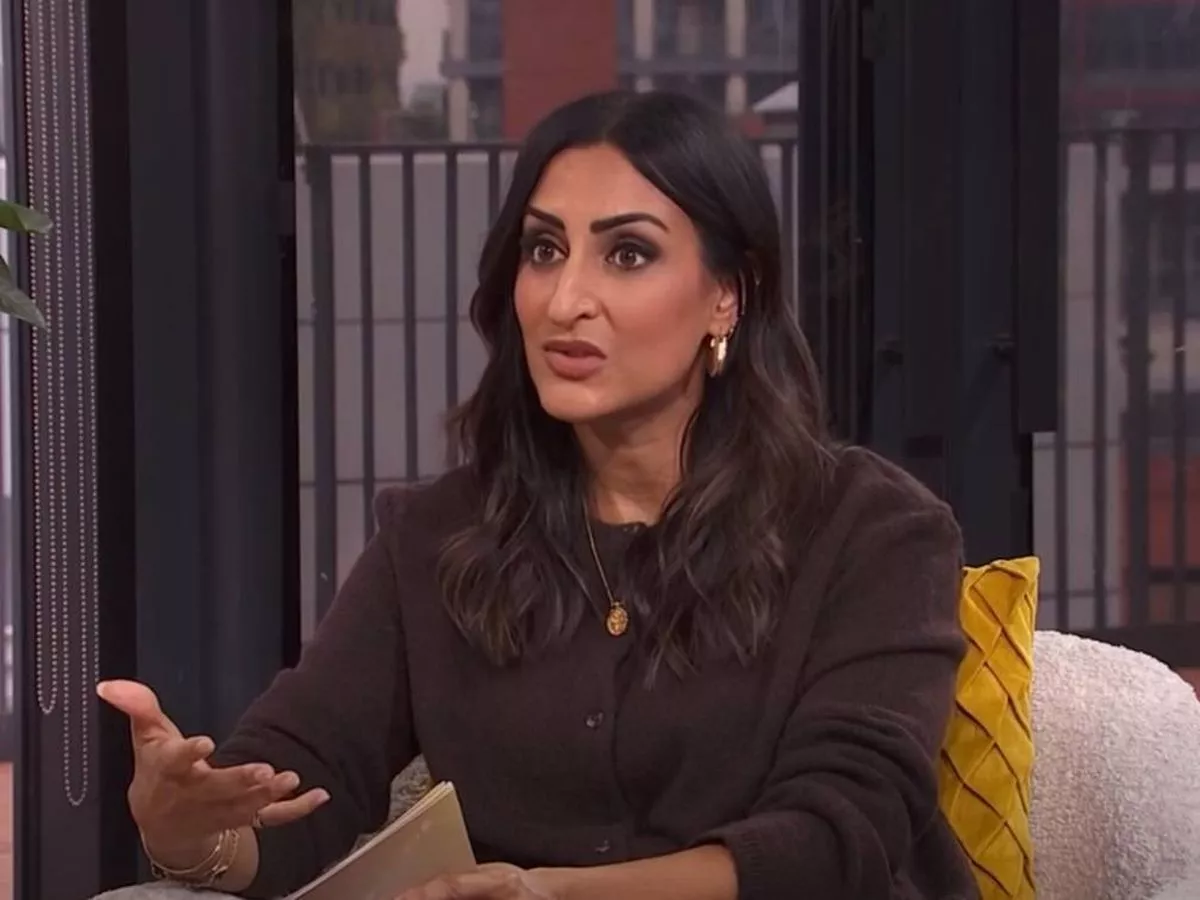Copyright birminghammail

BBC Morning Live's resident GP has issued a stark warning to those taking omeprazole - and highlighted one red flag symptom to be aware of. In the UK, one in four adults grapple with acid reflux, with many experiencing it at some point in their lives, particularly after tucking into a hefty meal. Those who consistently suffer from this uncomfortable condition may be prescribed PPIs like omeprazole to help manage symptoms. Read more One habit 'saves your heartbeats' and could help add years to your life However, Dr Punam has illuminated why people taking this medication need to exercise caution, especially if they are on it for an extended period, underlining the importance of regular health check-ups. Dr Punam, an active NHS GP, not only serves as the go-to doctor on BBC's Morning Live but also juggles multiple roles as a media medic, health broadcaster, and children's book author. Speaking to Morning Live hosts Gethin Jones and Helen Skelton, the health expert began her warning by explaining what acid reflux actually is. She said: "Acid reflux is all about what happens in your stomach. So we all have acid in our stomach and it has a very important role. The role of that is to break down and digest the food. "Now, at the top of the stomach, we have a little valve, a sphincter, and it acts like a trapdoor.", reports the Mirror . "And its job is to basically seal the contents so the acid is not essentially tracking back up the food pipe, your oesophagus. However, if that sphincter, that valve, becomes too loose, it can become very relaxed by things like heavy meals. "If you've had alcohol, if you lie down straight after having a heavy meal, that can actually mean that that acid from the stomach can end up creeping back up the food pipe and cause that heavy pressured burning sensation that people get." Presenter Gethin enquired: "What about the most common ways to treat it then?". Dr Punam explained: "So there are lots of different things that we can do. If, of course, you're having it just every now and then, then lots of people do get antacids or basically medications like alginates. Examples of that include Gaviscon. "And these basically help to just kind of neutralise the acid. They're very effective and you can just use them as and when needed. "However, if the discomfort is persistent, we often prescribe proton pump inhibitors, PPIs for short. Examples of these are omeprazole, lansoprazole. And these are incredible and have really transformed the way that we treat acid reflux. They essentially help to treat the acid production at the source." The NHS GP issued a stern warning to those taking PPIs, stating: "Essentially these medications aren't there to be used unnecessarily or for a long period of time. They do require us to review them. "And that's because if used over a long period of time, they can slightly increase your risk of things like low magnesium, low vitamin B12, but also increase the risk of gut infections, particularly Clostridioides difficile. We call that C. diff for short." Dr Punam emphasised the importance of routine check-ups for those taking PPIs long-term, explaining: "Now, we have this bacteria in our bowel, you and I, we all have it, and it lives in balance. "However, medications like PPIs can tip that balance. And if you get overgrowth of this bacterium, it can cause persistent diarrhoea. That is a red flag. "So you do need to speak to your doctor if that is an issue and you suddenly start developing diarrhoea. Or if you've got a change in bowel habit, we always say check in with your doctor. Just make sure that you are getting those reviews with your GP." Helen questioned: "I guess the trouble is if it works, you stick with it, don't you?" To which Dr Punam responded: "Yeah, it is." Gethin then added: "But you don't even know how long you're taking it for in the end, are you?" Dr Punam replied: "Well, that's just it. Sometimes you can just be taking it, and the problem is resolved, but you're just taking the medication. So do go in for your regular reviews." If you are taking omeprazole without a prescription, do not take it for longer than two weeks. You should see a doctor if: If your GP has prescribed omeprazole for long-term use, they should keep a close eye on you. Your GP should arrange follow-up appointments based on your specific health needs and risk factors, for instance, every six to 12 months. If you're on omeprazole for over a year, it's crucial to have regular check-ups to minimise the risk of enduring side effects. Signs of low magnesium can include muscle cramps, tiredness, and an irregular heartbeat, along with more general symptoms like loss of appetite, feeling sick, and weakness. More serious deficiencies can result in numbness, tingling, changes in personality, seizures, and abnormal heart rhythms. Indications of low vitamin B12 can include fatigue, weakness, pale skin, and a sore or swollen red tongue. Other symptoms can encompass neurological issues like pins and needles, balance problems, and memory issues, as well as breathlessness, heart palpitations, and digestive issues. Symptoms of a C. diff gut infection are watery diarrhoea, stomach cramps and pain, a high temperature (fever), feeling sick, loss of appetite, and dehydration. In severe cases, complications can occur, such as potentially fatal inflammation of the intestines. Helen queried: "What if you want to do something without medication? Can you ease the symptoms without taking any meds?". The NHS GP said: "So if you have got symptoms that have not settled despite you trying to manage them, then it is important to check in with your GP because we would want to investigate that further. "Ultimately, you want to find out what is the root cause of this and is it something more serious? We would do tests like checking for a bacterium called Helicobacter pylori, which increases the production of acid. We may refer you for a gastroscopy. This is a camera test that goes into the stomach to see is there any inflammation, any ulcers, anything more serious." Dr Punam then disclosed information about a groundbreaking new examination. "There is a really exciting pilot at the moment that is being tried out by the NHS across pharmacies in England," she said. "And it is to try to identify any early changes that could increase your risk of oesophageal cancer. It's called the sponge on a string test. And it involves putting a tiny capsule that's attached to a thread down through the mouth into the stomach. It opens up like a tiny little sponge. It takes little cells from the stomach and the lining of your food pipe, your oesophagus. We pull it back out, and essentially, it's easy if any cellular changes have happened. This is fantastic. If it is successful and it gets rolled out, we could pick up changes much earlier on." Dr Punam advised: "At the end of the day, medications are great, but there's lots of things that we can do every day in our lifestyles that make a massive, massive difference. The first thing is if you are struggling with heartburn, indigestion, acid reflux, then eat smaller portions. "If you eat big, heavy meals, you can actually put a lot of pressure on your stomach. Again, we're going back to that valve, which can become a bit lax and cause acid to track up. "Avoid lying down after a meal for at least three to four hours. When we lie flat, the sphincter relaxes, and acid can return to the oesophagus. "If you have symptoms, prop up your pillows so your chest is slightly higher than your waist, so you're just slouched up a little bit. Again, avoid lying flat. It really, really works a treat. "Don't wear tight clothes. We all want to loosen that button on your jeans after a meal, but actually just get into looser clothing because tight clothes can actually put a lot of pressure on your stomach as well. "Gentle teas like chamomile work really well. Ginger tea is fantastic. Chamomile works really well, ginger tea is fantastic. A lot of people turn to mint. Now mint is great if you've got IBS or tummy cramps, but actually for reflux it can make the problem worse. So stick to ginger tea or chamomile tea. "Avoid certain foods as well. Knowing your triggers. So keep a diary. I'm a big one for diaries. Look at when you get your symptoms, what have you had or done that day that could have exacerbated them. Taking them into your doctor is a real help to us. And that and also managing your weight. I think that goes without saying can make a big difference."



